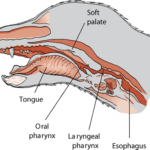Why Is My Dog Restless At Night
As the sun sets and the moon rises, your furry friend may start to exhibit restless behavior. You may find yourself wondering why your dog is restless at night. There are a number of reasons why dogs may become restless when the lights go out.
First, it’s important to understand that dogs have different sleep patterns than humans. While humans typically get eight hours of uninterrupted sleep each night, dogs tend to snooze throughout the day in short periods, waking up frequently during the night. This means that their natural tendencies may lead them to be more active at night.
Another factor that can contribute to your dog’s restlessness is anxiety. Dogs are social creatures and thrive on human interaction, but when left alone for extended periods, they can become anxious and stressed. This anxiety could manifest itself in whining, barking or pacing around the house.
In some cases, your dog’s restlessness could be due to an underlying medical condition. For example, your dog may be experiencing discomfort or pain from arthritis or an injury causing them to move around more at night. Additionally, senior dogs suffering from cognitive dysfunction syndrome (CDS), which is similar to Alzheimer’s disease in humans, may experience disorientation and confusion at night leading to restlessness.
If you suspect that your dog’s restlessness is due to a medical issue, it’s important to take them to a veterinarian for a proper diagnosis. Your vet may recommend medication or lifestyle changes that can help manage symptoms and improve your dog’s quality of life.
Aside from medical issues and anxiety, there are other factors that could be contributing to your dog’s nighttime restlessness. For example, if your dog is not getting enough exercise during the day or has had too much food before bedtime they may become restless as a result of excess energy or digestive discomfort.
So what can you do to help alleviate your pup’s nocturnal restlessness? Here are some tips:
1. Stick with a consistent routine: Dogs thrive on predictability, so try to keep a regular schedule for meals, exercise and bedtime.
2. Provide plenty of exercise during the day: A tired dog is a happy dog. Make sure your pup gets plenty of physical activity during the day to help them sleep more soundly at night.
3. Create a comfortable sleeping environment: Ensure that your dog’s bed is comfortable and located in an area with minimal distractions or noise.
4. Consider crate training: If your dog is crate trained, this could provide a sense of security and comfort at night.
5. Use calming aids: Some dogs may benefit from the use of calming aids such as pheromone diffusers or calming music to help soothe anxiety.
By understanding why your dog may be restless at night and taking steps to address any underlying issues, you can help ensure that both you and your furry friend get a good night’s rest. So go ahead, curl up next to your pooch and sweet dreams!



